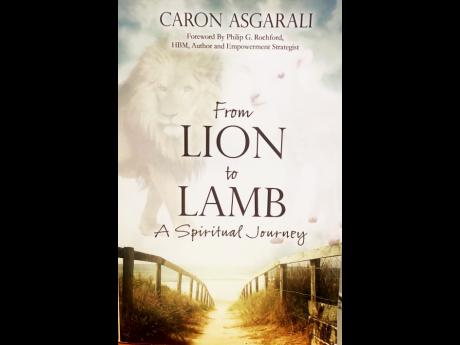Book Review | When ‘turn the other cheek’ comes to life
"On that night, Tuesday, twenty-ninth (29th) January, 2013, I went for a drive with a friend ... . We suddenly realised something went wrong ... . Although I did not see any weapon, I ... instinctively moved to protect myself. There was a loud, dull noise and the car window was shattered ... It was only as we sped off I realised that I was hearing noises, gun shots ... It was only when I felt my face...[when] I felt something warm flowing from my chin did I confirm that I had been hit ... in the face."
(Caron Asgarali recalls the fateful day that changed her life.)
Caron Asgarali tells a wrenchingly gripping tale of violence, trepidation, faith and redemption. From Lion to Lamb is Asgarali's story, a revelation of manifest destiny.
Her words flow with the authenticity, poise and grace of a sage. Moulded by the experience, she wears a new mantle, one of wisdom and patience. Not unlike biblical Job, she never recoils at her debilitation. She is unswerving, the consummate believer.
That her words are divinely driven she is certain, and at the outset, she reveals that much: "Initially I started compiling a story based on the terrible incident in which I was a victim of a violent crime ... . What took me almost a year to compile was retold in about two weeks under God's directive, that it be done using the Beatitudes from the Sermon on the Mount as told in the New Testament, Matthew 5:1-12."
Hers was no longer a story of wretchedness, but one of inspiration, courage and optimism. Of God's succour she is assured.
In the vein of existentialist Victor Frankl, she finds meaning in the bosom of despair.
SPIRITUAL GROWTH
She writes of her spiritual growth, " I thought I had learnt what surrendering to God meant when my father got ill and eventually passed away. I have come to the realisation that it has far deeper implications."
During her most dire moments, Asgarali teeters between spiritual planes, but she resettles on this sphere. An earthly assignment awaits her.
While Asgarali's religiosity is uncompromising, agnostics will find her work refreshingly novel and highly interpretative. A dye-in-wool, buttoned-down writer she is not.
Surely, we can shoehorn other explanations for her miraculous recovery, but there is no need to. Readers will find her a sympathetic figure, not because of the horror she survived, but because of the disarming quietude and richness of her delivery. An adept raconteur she proves to be.
Asgarali withstands a shattered jaw and the uneasiness of bullet fragments still lodged in her body. And bandaged with tubes protruding from her upper torso, many, she imagined, would have recoiled from her disfigurement. She recounts, "In the beginning those visits must have been very difficult for my friends and family, especially they first they came. To see me with a tube in my neck, the tracheotomy, with a tube through my nose, (the nasogastric or NG) with the IV tube for medication, and with mounds of bandages on my jaws and chin, would have been challenging ... But I think the most formidable obstacle would have been dribbling."
She describes constant oozing of fluids and being unaware of the mess on her person. "I started using rolls and rolls of paper towels, constantly wiping without really knowing if I was or was not wet."
The tragic incident was transformative. Asgarali pens, "At this turning point in my life, everything changed: my perspective on life, my patience level, my tolerance level ... . Everything that seemed so important prior to the crime suddenly faded into the recesses of my mind; the majors of yesterday retreated to the point of inconsequence."
Interestingly, she poses the most meaningful question during the time: Why?
She searchingly asks, "Was it because I had changed the course of my journey? Was it because I was a bad person? What could I have done differently so that this would not have happened? How soon could I start back to teach? Will I be able to speak? What would I eventually look like?"
Remarkably, she surmounts her many fears and is enlightened in the face of affliction. Steadfast in her admonitions she shares the following: "Have empathy and love for those who may be suffering; engage young, be of service to others; be selfless - that is think of others not just yourself, joy comes when we give, be magnanimous, and conquer hurt and anger, doubt and sorrow with love and forgiveness."
From Lion to Lamb is a testament, a pedagogy of faith that raises a slew of enquiries related to life's purpose, predestination, free will, and karma. Moreover, we are moved to ask: When cornered by violence and affliction, how will we respond?
Expectedly, this testimony will elicit widespread praise from the religious, but not unsurprisingly, it will pique the interest of the most inveterate sceptic, if only to make sense of the hail of torments that somehow rain down on the most innocent and undeserving among us.
From Lion to Lamb: A Spiritual Journey by Caron Asgarali
Available on Amazon
Rating: Highly recommended
Feedback: glenvilleashby@gmail.com or on Twitter@glenvilleashby


